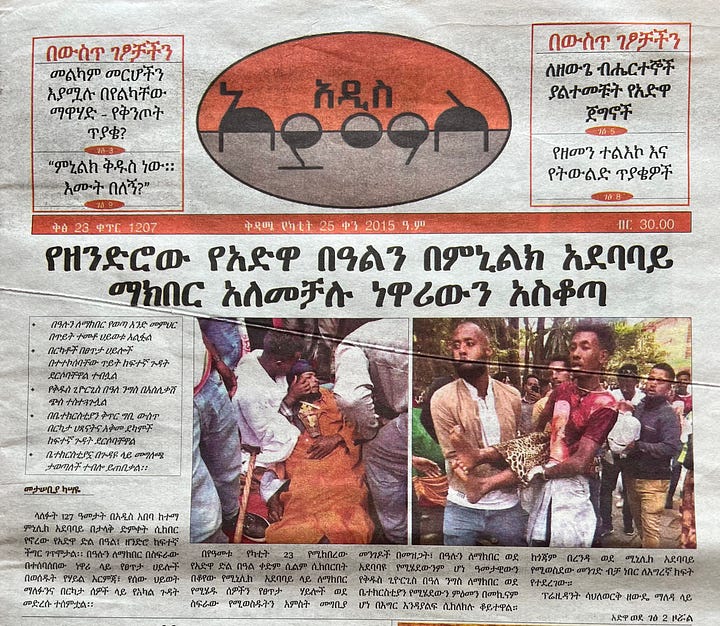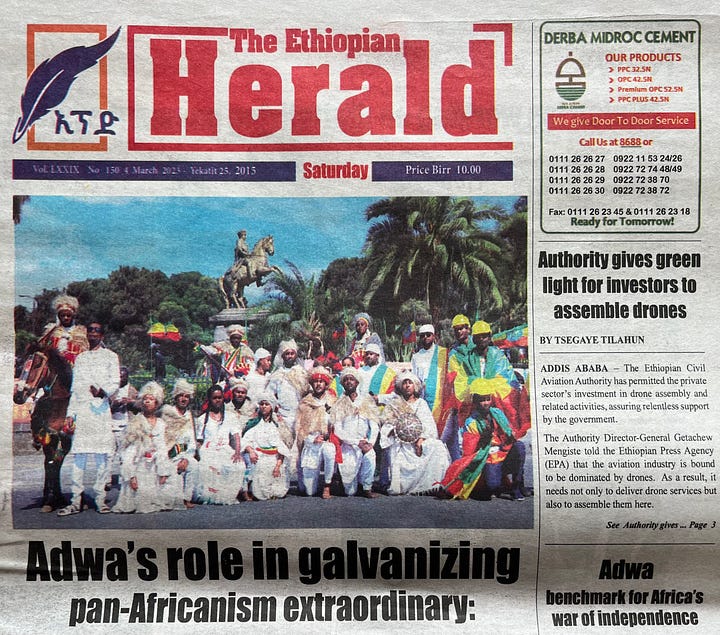Adwa
Adwa Victory day celebrations held last week on Thursday, March 2, turned violent when security forces disrupted a peaceful gathering of people around Menelik Square. They have ‘needlessly beaten people, used tear gas, plastic and lethal bullets and other excessive measures including on older persons and children resulting in at least one death’ according to this report by the Ethiopia Human Rights Commission.
Addis Admas (in its print edition on Saturday) reported that it was a teacher named ሚሊዮን ወዳጅ (Million Wedaj) who had lost his life that day. He had come out to celebrate the holiday and was shot by security forces who were firing plastic and real bullets to disperse the crowd.
This was the 127th year of celebration.
Here's what I thought was an interesting excerpt from the Commissioner’s statement:
‘Peaceful’ shall be interpreted to include conduct that annoys or gives offence as well as conduct that temporarily hinders, impedes or obstructs the activities of third parties. Isolated acts of violence do not render an assembly as a whole non-peaceful."
The events of the day made front page news on two newspapers on Saturday; private media house Addis Admas, and state-owned Ethiopian Herald, photos below.


Ethiopia wants UN investigators out
Amnesty International has called on members of the UN Human Rights Council to reject the Ethiopian government’s lobbying to end a UN investigation into war crimes.
What? The UN Human Rights Council established the International Commission of Human Rights Experts on Ethiopia a year after war broke out in the country to investigate human rights violations.
Okay, and? The Ethiopian government has, since the beginning, opposed this Commission’s establishment. When the one-year mandate of the Commission came to an end last year, the Ethiopian government was against an extension. (The extension was requested because the Commission was unable to finish its investigation in one year).
Why? The Ethiopian government says that the Commission’s work is politically motivated and the report it produced was flawed. The report of the Commission implicates both warring sides to have committed war crimes and crimes against humanity including using starvation as a weapon of war.
The Commission is on its second-year mandate now, but the Ethiopian government is lobbying for this to be cut short according to reports.
What else? During the AU Summit, at the ministerial opening, deputy Prime Minister Demeke Mekonnen spoke about the Commission’s work and how it could ‘undermine the AU-led peace process’ in Ethiopia.
Here’s the story in Amharic and my report for VOA.
On the referendum
The National Electoral Board of Ethiopia has passed a decision on Welayta Zone. The referendum which took place across six zones and five special weredas, was found to have had serious electoral irregularities in Welayta, and the board has decided to redo the voting. Welayta Zone comprised about one third of around 3 million registered voters from initial reports. Now, the board has said that there’s no way to substantiate these numbers due to these violations in the (registration) process.
The results of this referendum will have to wait for now but this should be one to keep an eye on. The story on Ethiopia Insider in Amharic here.
On a related note
Gurage Zone has been formally requesting a regional statehood status for years now. There have been boycotts and strikes in the past year as a way of asking for this self-determination and as a protest to the federal government’s restructuring of the states in the south (Southern Nations Nationalities and People’s Region).
These strikes have turned violent in the past and Gurage Zone has been under command post since November last year. Security forces have now arrested multiple government officials and activists according to this report by Addis Standard.
If you’re looking to understand what has been happening in Gurage Zone, I highly recommend Addis Standard as they have followed these events closely.
Gurage Zone capital, Welkite, had water protests that turned violent a couple of weeks ago. Here’s a highlight from my previous post.
From Tigray Region
A outline for the formation of an interim regional administration in Tigray has been finalized. According to the Pretoria peace deal, the interim regional administration will oversee matters of the region until elections are held for Tigray’s regional council. This is taking place while opposition parties in the region are saying the creation of this interim government has not been inclusive. The Tigray People’s Liberation Front says it’s waiting on the federal government to weigh in.
Here’s an interesting news analysis from Ethiopia insight on this issue. An excerpt from the article reads,
“Unless Tigrayan scholars and the business community take the initiative to help broker a compromise, tensions between the TPLF and opposition parties may destabilize Tigray’s post-war transition.”
and here’s a tweet on the issue by TPLF spokesperson, Getachew Reda,

Also from Tigray,
Journalists from media house Dimtsi Woyane, owned by the Tigray People’s Liberation Front, have resigned, citing restriction on editorial freedom. The head of the station said that this is just journalists “who have political interests and are cooperating with external forces…” Something about this phrase is eerily familiar. Full story here.
In other news
Remember the story on 12th grade students’ examination results? Who could ever forget? But incase you did, from nearly 900,000 students who took school leaving exams, a little over 29,000 passed on to university. The fate of the rest has been announced; 600,000 are headed for technical and vocational schools. Around 100,000 will be taking remedial classes in university for a year, and have the opportunity to restart as freshman the following year . A detailed breakdown on this here.
Ethiopia Insight produced an analysis piece on the recent events related to the Ethiopian Orthodox Tewahedo Church.
Shortage of foreign currency is affecting essential medicine supply according to a report by Capital Newspaper. The website is down so check on it sometime later for the story or pick up a print copy if you’re in Addis.
Protests have led to the death of civilians in Guji Zone, following the decision to restructure zonal and district administrative units in Oromia Region. More on this here.
That’s all for this week. I’ll be back next week with more updates!
Please help support my work by forwarding this email to friends and family who might benefit from keeping up with whats’s going on.
Note: I go through all the major news outlets, newspapers, online publications, and will at times, include reports, notes on parliamentary sessions, and go through fact checking websites as well. I try to provide links to both English and Amharic sources, and I usually time stamp the video I link to unless I think the whole video is relevant.



